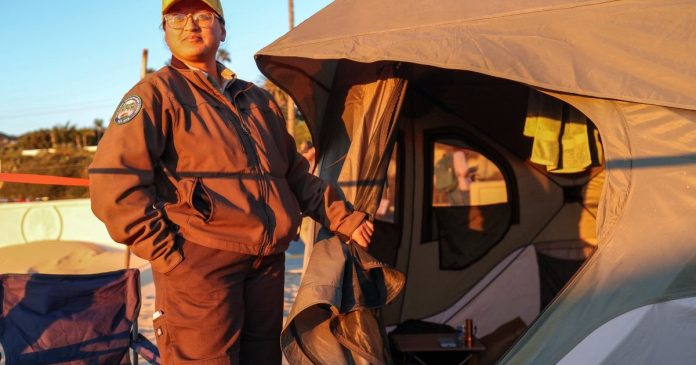A busy village has emerged on the sandy shores of a beach in Malibu, hosting thousands of firefighters.
Firefighters from various parts of North America rest and rejuvenate on Zuma Beach when they are not actively fighting the wildfires in Los Angeles.
Approximately 5,000 first responders gather among trailers and tents. The camp buzzes with activity before sunrise, as a long line forms for breakfast.
The emblems of numerous firefighting units indicate the presence of teams from California, the western U.S., as well as a group of recently arrived Mexican firefighters.
Breakfast is a vital meal for many, providing the necessary energy before their shifts.
The meals are prepared by a team of inmates from California prisons, brought in to assist during one of the state’s largest disaster responses.
Correctional Officer Terry Cook, overseeing the inmates at the camp, shared that he sometimes recognizes former inmates among the regular firefighters, individuals who have turned their lives around after serving their sentences.
Two significant fires in Los Angeles have burned 40,000 acres since starting last Tuesday in strong winds.
At least 24 people have lost their lives in the fires, which have destroyed over 12,000 structures and displaced 92,000 individuals, including residents of Pacific Palisades, located near the firefighters’ camp.
Following breakfast, teams prepare their vehicles and stock up on snacks, sandwiches, drinks, and sweets.
Given the threat of dangerous winds in the area, some units focus on addressing new fire outbreaks while others work to contain the original blaze.
With orders in hand, each team sets out, spreading out in Pacific Palisades or venturing into the wild terrain of Topanga Canyon.
For some, this marks their first experience in the field as part of the firefighting effort, while for others, it represents another challenging day in an already arduous week.
As he prepares to enter Mandeville Canyon, Jake Dean, a 26-year firefighter, reflects on the unprecedented destruction caused by the fire.
“After the initial day, even my acquaintances from base camp could hardly recognize me,” he shared. “I was so fatigued and covered in dirt that even my phone struggled to recognize me.”
Yet, with extensive air operations making progress in containing the fire from all angles, Dean senses the hard work is yielding results.
“Today shouldn’t be too difficult,” he remarked. “We will pace ourselves, stay hydrated, and remain prepared for a long period of work here and in future fires.”




